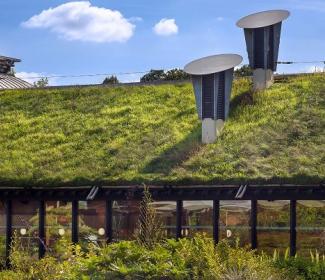How is smart technology empowering Scottish rural energy projects?

In this guest blog, Head of Policy and Communications in Scotland for Smart Energy GB John MacNeil tells us how communities are turning to smart technology, like smart meters, to help address the barriers involved in harnessing renewable energy sources.
Rural communities sometimes draw the short straw when it comes to energy options, with homes that are often less energy efficient and dependent on more expensive heating fuels.
The obvious solution would be to harness wind, solar or hydro sources but many rural communities face challenges linked to the limitations of the local distribution network infrastructure. In some cases, local electricity networks cannot accept new connections from renewable energy sources. As a result, in the past local renewables have often not been harnessed and local community energy generation projects are deemed too expensive.
However, a new report has discovered that a number of communities are turning to smart technology, including smart meters, to address the barriers involved in harnessing renewable sources. A Smart Energy Future for Rural Areas, commissioned by Smart Energy GB and carried out by Arad Research, is the latest in a series of reports exploring the transformative potential role of smart meter data in diverse areas of our lives. It investigates several areas in Scotland which have set up smart community energy projects, using the technology to monitor local networks and stop them from becoming overloaded. In turn, this ‘real-time’ data allows greater control over the network, enabling more community renewable energy projects to come online.
Heat Smart Orkney is one such project run by the Rousay, Egilsay & Wyre Development Trust alongside Community Energy Scotland. Community-owned wind turbines in Orkney have significant power capacity, but at times of low local electricity use the supply of energy can outstrip demand by a large amount. Automated equipment is being installed in households to switch on devices such as smart storage heaters and water heaters, that increase local demand for electricity, and displace oil/coal. Matching supply to demand reduces the likelihood of the network reaching capacity and enables wind generators to keep producing energy.
Once Heat Smart Orkney is up and running, participating households in the project will receive a rebate on their increased electricity consumption, funded by increased income to the community turbines. This reduces the cost of their electricity and makes it more competitive with oil heating.
There are many benefits of using smart technology in rural community energy projects and include an improvement in the stability and security of local energy supply, an increase in the use of renewable generation and of energy that is produced locally, and a reduction in consumer costs and fuel poverty.
Another important purpose of smart technology is to encourage behaviour change in householders, leading to a reduction in their energy use. In rural areas, many projects have tried to encourage customers to change their energy use through time-of-use tariffs, lower tariffs for locally produced, renewable energy and capping energy use for households and businesses. In all of these projects, smart technology makes it easy for customers to be aware of their energy use and to change their behaviour as a result. And excitingly, it’s not just residents in rural areas who can benefit from smart technology - the current GB-wide rollout of smart meters, which show you exactly how much energy you are using in pounds and pence, gives everyone the ability to monitor their energy, and could enable further incentive projects to develop.
As programmes such as the Rural Community Energy Fund and Local Energy Challenge Fund develop, the evidence of the benefits of smart technology is likely to become clearer. However, the range of current examples are strong evidence of the positive role that smart technology has to play in the future of rural community energy.
Visit the Smart Energy GB website for more information on Smart Meters and how you can get one for free.
